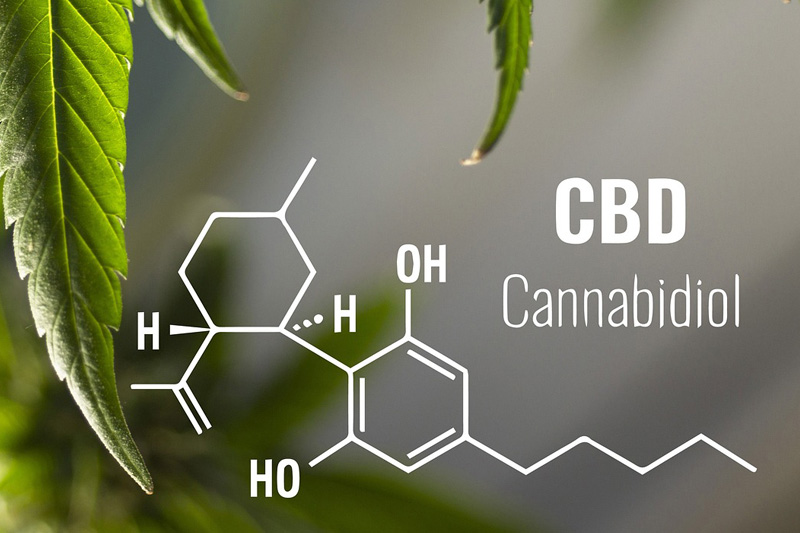Table of Contents [show]

Unlock the extraordinary potential of CBD and discover a world of wellness like never before! In recent years, CBD has taken the health and wellness industry by storm, captivating millions with its incredible benefits. From relieving pain to reducing anxiety, improving sleep to promoting brain health – this natural compound offers a multitude of advantages for your overall well-being. So, if you’re ready to embark on a journey towards optimal health, join us as we explore the 10 incredible benefits of CBD that can revolutionize your life. Get ready to experience a new level of vitality and embrace the power of CBD!
What is CBD?
CBD, short for cannabidiol, is a natural compound derived from the cannabis plant. However, unlike its cousin THC (tetrahydrocannabinol), CBD does not cause psychoactive effects or make you feel “high.” Instead, it offers a wide range of potential health benefits.
How does CBD work in the body? Well, we have an intricate network within us called the endocannabinoid system (ECS). This system plays a vital role in regulating various functions such as pain sensation, mood, sleep cycles, and immune response. CBD interacts with receptors in our ECS to help restore balance and promote overall well-being.
The science behind CBD’s health benefits is fascinating. Researchers believe that CBD may act as an anti-inflammatory agent by reducing cytokine production and inhibiting the activation of inflammatory pathways. This could potentially provide relief for those suffering from chronic pain conditions or inflammatory diseases.
Moreover, studies suggest that CBD may have anxiolytic properties, meaning it can help reduce anxiety and stress levels. It interacts with serotonin receptors in the brain to modulate mood and promote feelings of calmness.
Another impressive benefit of CBD is its potential to improve sleep quality. Many individuals struggle with insomnia or disrupted sleep patterns due to various reasons such as anxiety or chronic pain. Research indicates that CBD can help regulate sleep-wake cycles by interacting with receptors involved in controlling sleep regulation.
When it comes to skincare, did you know that CBD holds promise for improving skin health? It has been found to possess antibacterial properties while also helping balance sebum production – making it beneficial for acne-prone individuals. Additionally, its antioxidant properties may protect against oxidative damage caused by free radicals and aging factors.
Furthermore, there are exciting possibilities regarding neuroprotective properties attributed to CBD. Preliminary research suggests that this compound might offer protection against certain neurological disorders like Alzheimer’s disease and multiple sclerosis through its anti-inflammatory actions on brain cells.
The potential cancer-preventive and treatment properties of CBD are also being explored. Some
How Does CBD Work in the Body?
CBD, short for cannabidiol, is a natural compound found in hemp plants. It interacts with our body’s endocannabinoid system (ECS), which plays a crucial role in maintaining balance and overall well-being.
When we consume CBD, it binds to receptors in our ECS, known as CB1 and CB2 receptors. These receptors are located throughout our bodies – in the brain, nervous system, immune cells, and other organs.
By binding to these receptors, CBD helps regulate various bodily functions such as pain perception, mood regulation, inflammation response, sleep patterns, and immune system responses.
One of the main ways that CBD works is by reducing inflammation. Inflammation is often at the root of many health issues including chronic pain conditions like arthritis or fibromyalgia. By targeting inflammatory pathways in the body, CBD can help alleviate pain and reduce swelling.
Additionally,CBD has been shown to interact with serotonin receptors in the brain. Serotonin is a neurotransmitter responsible for regulating mood and anxiety levels. By modulating serotonin activity,CBD may have anxiolytic effects,reducing feelings of stressand promoting relaxation.
Furthermore,CBD may also promote better sleep quality.
CBD has been found to interact with receptors involvedin regulating sleep-wake cycles.
By influencing these pathways,CBD could potentially improve insomnia symptoms or aid those struggling with sleep disorders
The science behind howCBDworks withinthe bodyis still being explored,and researchers continue to uncover new mechanisms through which it exerts its beneficial effects.
However,the existing evidence suggests thatCBDhas significant potentialto support our healthand well-beingin various ways.
So whether you’re seeking relief from pain,stress management,a good night’s sleepor other benefits,cannabidiolmay be worth consideringas partof your wellness routine
The Science Behind CBD’s Health Benefits
CBD, or cannabidiol, is a compound found in the cannabis plant that has gained widespread attention for its potential health benefits. But how does it actually work in the body?
First and foremost, it’s important to note that CBD is non-psychoactive, meaning it won’t get you high like THC, another compound found in cannabis. Instead, CBD interacts with the body’s endocannabinoid system (ECS), which plays a crucial role in regulating various physiological processes.
The ECS consists of receptors located throughout the body and brain. When CBD enters the bloodstream, it binds to these receptors and enhances their function. This interaction helps to restore balance within the body and promote overall well-being.
One of the key mechanisms by which CBD exerts its effects is through its anti-inflammatory properties. Inflammation is at the root of many chronic conditions such as arthritis, autoimmune diseases, and even neurodegenerative disorders like Alzheimer’s disease. By reducing inflammation, CBD can help alleviate symptoms and improve quality of life.
Furthermore, studies have shown that CBD has analgesic properties – meaning it can help relieve pain. Whether it’s acute pain from an injury or chronic pain from conditions like fibromyalgia or multiple sclerosis, CBD may offer natural relief without unwanted side effects.
But perhaps one of the most exciting aspects of CBD is its potential as an anti-anxiety agent. Anxiety disorders are among the most common mental health issues worldwide and can greatly impact daily functioning. Research suggests that CBD may help reduce anxiety by interacting with serotonin receptors in the brain – similar to how certain antidepressant medications work.
In addition to anxiety reduction, preliminary research also indicates that CBD may improve sleep quality for those struggling with insomnia or other sleep disorders. By calming racing thoughts and promoting relaxation, individuals who incorporate CBD into their bedtime routine may experience more restful nights.
Beyond mental health benefits, CBD has shown promise in promoting healthy skin. Its anti-inflammatory and antioxidant properties can
8 Proven Benefits of CBD for Your Health:
1. Pain and Inflammation Relief: CBD has been shown to have powerful analgesic properties, making it an effective option for managing chronic pain conditions such as arthritis or fibromyalgia. It works by interacting with receptors in the endocannabinoid system, reducing inflammation and alleviating discomfort.
2. Anxiety and Stress Management:
CBD has gained popularity as a natural alternative to pharmaceuticals for anxiety and stress relief. Studies suggest that it can help regulate mood, reduce feelings of anxiousness, and promote a sense of calmness without the psychoactive effects associated with THC.
3. Improved Sleep Quality:
If you struggle with insomnia or other sleep disorders, CBD may offer some relief. Its calming effects can help relax both the mind and body, allowing for better sleep quality and restful nights.
4. Skin Health and Acne Treatment:
CBD’s anti-inflammatory properties make it a promising ingredient in skincare products targeting acne-prone or inflamed skin conditions like eczema or psoriasis. Additionally, its antioxidant properties protect against free radicals that contribute to premature aging.
5. Neuroprotective Properties for Brain Health:
Studies suggest that CBD shows promise in protecting brain cells from damage caused by neurodegenerative diseases such as Alzheimer’s or Parkinson’s disease. It may also aid in improving cognitive function.
6. Potential Cancer Prevention and Treatment:
While research is still ongoing, initial studies show that CBD may possess anti-cancer properties due to its ability to inhibit tumor growth by inducing programmed cell death (apoptosis) while leaving healthy cells unaffected.
7. Cardiovascular Health Improvement:
CBD has been linked to various cardiovascular benefits such as reducing blood pressure levels, decreasing inflammation within blood vessels, preventing oxidative stress on the heart muscles, ultimately promoting overall heart health.
8: Anti-Seizure & Epilepsy Management:
One of the most well-known benefits of CBD is its efficacy in reducing seizures, particularly in individuals with epilepsy.
– Pain and Inflammation Relief
CBD has gained significant attention in recent years for its potential to provide relief from pain and inflammation. Many individuals are turning to CBD as a natural alternative to traditional pain medications, and the results have been promising.
One of the primary ways that CBD helps with pain relief is by interacting with the body’s endocannabinoid system (ECS). The ECS plays a crucial role in regulating various bodily functions, including pain perception. When CBD interacts with receptors in the ECS, it can help reduce inflammation and alleviate discomfort.
Additionally, CBD has been found to have analgesic properties, meaning it can directly target and reduce pain signals in the body. This makes it an attractive option for those suffering from chronic conditions such as arthritis or fibromyalgia.
Furthermore, studies have shown that CBD may also help with neuropathic pain, which is caused by nerve damage. By modulating neurotransmitter activity and reducing inflammation in affected areas, CBD can potentially provide relief from this type of chronic pain.
Moreover, unlike many pharmaceutical drugs used for pain management, CBD is generally well-tolerated and not associated with severe side effects or addiction risks. This makes it a safer choice for long-term use.
While more research is needed to fully understand how exactly CBD works for pain relief and inflammation reduction; current evidence suggests that it holds promise as a natural remedy for managing various types of discomfort. Whether you’re dealing with acute injuries or chronic conditions causing persistent discomfort – considering trying out high-quality CBD products could be worth exploring!
– Anxiety and Stress Management
Anxiety and stress are two common issues that many people face in today’s fast-paced world. The constant pressures of work, relationships, and everyday life can take a toll on our mental well-being. Fortunately, CBD has shown great promise in helping to manage anxiety and reduce stress levels.
Several studies have demonstrated the anxiolytic effects of CBD, meaning it can help alleviate symptoms of anxiety disorders such as generalized anxiety disorder (GAD), social anxiety disorder (SAD), and post-traumatic stress disorder (PTSD). CBD interacts with receptors in the brain that regulate fear and stress responses, promoting a sense of calmness.
CBD also has the potential to improve mood and promote relaxation. It works by increasing the availability of serotonin, a neurotransmitter responsible for regulating mood and emotions. By boosting serotonin levels in the brain, CBD may help reduce feelings of anxiousness or restlessness.
Another way CBD helps manage anxiety is by reducing physiological symptoms associated with stress, such as increased heart rate and blood pressure. Studies have found that CBD can help lower these markers of stress response, leading to a more relaxed state.
In addition to its anxiolytic properties, CBD may also be beneficial for individuals struggling with sleep disturbances caused by anxiety or stress. By promoting better sleep quality and reducing insomnia symptoms, CBD can contribute to overall improved well-being.
It’s important to note that while research suggests promising results regarding using CBD for managing anxiety and stress-related disorders, more studies are needed to fully understand its long-term effects. As always, it’s essential to consult with a healthcare professional before incorporating any new supplements into your routine.
– Improved Sleep Quality
Getting a good night’s sleep is essential for overall health and well-being. Unfortunately, many people struggle with sleep issues such as insomnia or restless nights. This is where CBD comes in.
CBD has been shown to have a positive impact on sleep quality by promoting relaxation and reducing anxiety. When we are stressed or anxious, it can be difficult to wind down and fall asleep. CBD interacts with receptors in the brain that regulate our stress response, helping us feel calm and relaxed.
In addition to its calming effects, CBD may also help regulate our sleep-wake cycle. Our bodies naturally produce a hormone called melatonin that helps us fall asleep at night. Studies have found that CBD can increase levels of melatonin in the body, leading to improved sleep quality.
Another way CBD improves sleep is by reducing pain and inflammation. Chronic pain conditions such as arthritis or fibromyalgia can make it incredibly difficult to get comfortable and find restful sleep. By alleviating pain and inflammation, CBD allows individuals to experience deeper, more restorative sleep.
Incorporating CBD into your nightly routine could lead to improved sleep quality and better overall health. Whether you’re struggling with insomnia or simply want to enhance your sleeping habits, consider giving CBD a try for a more peaceful night’s rest!
– Skin Health and Acne Treatment
When it comes to taking care of our skin, we’re always on the lookout for products that can help improve its health and appearance. CBD has gained popularity in recent years as a potential treatment for various skin conditions, including acne.
Acne is a common skin problem that affects millions of people worldwide. It can be caused by factors such as genetics, hormonal changes, and inflammation. Traditional treatments often come with side effects and may not be effective for everyone.
CBD offers a natural alternative for treating acne. Its anti-inflammatory properties help reduce redness and swelling associated with breakouts. Additionally, CBD helps regulate oil production in the skin, which can prevent clogged pores and minimize the formation of pimples.
Furthermore, CBD’s antioxidant properties play a role in promoting overall skin health. Antioxidants combat free radicals that damage cells and contribute to premature aging. By using CBD-infused skincare products or topicals, you can nourish your skin while protecting it from environmental stressors.
It’s important to note that more research is needed to fully understand how exactly CBD interacts with the skin and its specific benefits for acne treatment. However, many individuals have reported positive results when incorporating CBD into their skincare routine.
If you struggle with acne or want to improve your overall skin health naturally, consider exploring the potential benefits of CBD-based products specifically designed for skincare purposes!
– Neuroprotective Properties for Brain Health
When it comes to our brain health, we all want to ensure that we’re doing everything possible to protect and enhance its function. This is where CBD comes into play, offering neuroprotective properties that can support optimal brain health.
Research has shown that CBD has the ability to interact with receptors in the brain, known as CB1 receptors. These receptors are found in parts of the brain responsible for memory, learning, and cognition. By interacting with these receptors, CBD may help promote neurogenesis – the growth of new neurons – which can improve overall brain function.
Additionally, CBD has been shown to have anti-inflammatory effects in the brain. Chronic inflammation in the brain has been linked to various neurological disorders such as Alzheimer’s disease and multiple sclerosis. By reducing inflammation, CBD can potentially help prevent or slow down the progression of these conditions.
Moreover, studies have indicated that CBD may have antioxidant properties as well. Oxidative stress is a major contributor to age-related cognitive decline and neurodegenerative diseases. As an antioxidant, CBD can neutralize harmful free radicals and protect against oxidative damage in the brain.
Furthermore, preliminary research suggests that CBD could be beneficial in treating certain neurological disorders like epilepsy and Parkinson’s disease. It appears that this compound may help reduce seizures by regulating electrical activity in the brain and mitigating symptoms associated with movement disorders.
While more research is needed to fully understand how exactly CBD works on a molecular level within our brains, its potential benefits for neuroprotection are promising. Incorporating CBD into your wellness routine might just be what you need for better cognitive function and long-term brain health.
– Potential Cancer Prevention and Treatment
Cancer is a devastating disease that affects millions of people worldwide. It can be incredibly challenging to treat, often requiring aggressive therapies with severe side effects. However, recent studies have shown promising results in using CBD as a potential treatment for cancer.
One of the ways CBD may help prevent and treat cancer is by inhibiting the growth of tumor cells. Research has found that CBD can induce apoptosis or programmed cell death in certain types of cancer cells, effectively stopping their proliferation.
Additionally, CBD has been shown to possess anti-inflammatory properties, which are crucial in preventing chronic inflammation—a known risk factor for developing various types of cancers. By reducing inflammation in the body, CBD may potentially lower the chances of developing cancer.
Furthermore, some studies suggest that CBD might be beneficial in alleviating the side effects experienced during conventional cancer treatments like chemotherapy. These include nausea and vomiting, pain management, and appetite stimulation.
While more research is needed to fully understand how CBD can be used as an effective tool against cancer, these preliminary findings offer hope for patients seeking alternative treatments with fewer adverse effects.
It’s important to note that while CBD shows promise in preventing/treating certain forms of cancer and managing its symptoms, it should never replace traditional medical treatments recommended by healthcare professionals. Always consult with your doctor before incorporating any new therapies into your treatment plan.
– Cardiovascular Health Improvement
Cardiovascular health is a crucial aspect of our overall well-being, and CBD has shown promising potential in improving it. Research suggests that CBD may have positive effects on various cardiovascular conditions.
One way CBD can potentially benefit cardiovascular health is by reducing blood pressure. High blood pressure is a major risk factor for heart disease, and studies have found that CBD may help lower blood pressure levels. It does this by interacting with receptors in the body’s endocannabinoid system, which play a role in regulating blood pressure.
In addition to lowering blood pressure, CBD also has antioxidant properties that can help protect against oxidative stress and inflammation. These factors are linked to the development of heart disease. By reducing oxidative stress and inflammation, CBD may contribute to better heart health.
Furthermore, some studies suggest that CBD might have anti-arrhythmic effects, meaning it could help regulate abnormal heart rhythms. This could be beneficial for individuals who experience arrhythmias or other cardiac rhythm disorders.
While more research is needed to fully understand how exactly CBD affects cardiovascular health, these preliminary findings are certainly encouraging. Incorporating CBD into your wellness routine may offer potential benefits for supporting a healthy heart and maintaining optimal cardiovascular function.
– Anti-Seizure and Epilepsy Management
One of the most promising benefits of CBD is its potential to manage seizures and epilepsy. Epilepsy is a neurological disorder characterized by recurrent seizures, which can be debilitating for those who suffer from it. Traditional treatment options often come with adverse side effects and may not provide adequate relief for everyone.
However, studies have shown that CBD has anticonvulsant properties that can effectively reduce seizure activity. In fact, the FDA has approved a CBD-based medication called Epidiolex specifically for treating severe forms of epilepsy in children.
CBD interacts with receptors in the brain known as CB1 receptors, which play a role in regulating neurotransmitter release and neuronal excitability. By modulating these receptors, CBD helps to inhibit excessive electrical activity in the brain that leads to seizures.
Furthermore, CBD’s anti-inflammatory properties also contribute to its effectiveness in managing epilepsy. Chronic inflammation within the brain can worsen seizure frequency and severity, but CBD works to reduce inflammation and promote overall brain health.
While more research is still needed to fully understand how exactly CBD works for seizure management, countless anecdotal reports from individuals with epilepsy attest to its effectiveness. Many people have experienced significant reductions in seizure frequency or even complete cessation of seizures after incorporating CBD into their treatment regimen.
In conclusion,
CBD shows great promise as an alternative treatment option for those suffering from epileptic disorders or experiencing frequent seizures. Its ability to interact with CB1 receptors and reduce inflammation within the brain makes it a powerful tool in managing this condition. With ongoing research efforts focused on uncovering more about this incredible cannabinoid’s therapeutic potential, we are likely only scratching the surface of what it can do for epilepsy sufferers around the world.
– Addiction Recovery
As we’ve explored the incredible benefits of CBD for your health and well-being, it’s important to highlight one more area where CBD has shown great promise: addiction recovery. Addiction can be a devastating and challenging battle, but CBD may offer some much-needed support.
Research suggests that CBD may help reduce drug cravings and alleviate withdrawal symptoms in individuals struggling with substance abuse. It works by interacting with the endocannabinoid system, which plays a crucial role in regulating various physiological processes, including addiction.
CBD has been studied for its potential application in managing opioid addiction. One study found that CBD reduced cue-induced cravings and anxiety in heroin users, leading to less drug-seeking behavior. Another study showed that CBD reduced cocaine self-administration and prevented relapse without adverse side effects.
Additionally, research indicates that CBD may be beneficial for individuals recovering from alcohol addiction. A preclinical study demonstrated that administering CBD during alcohol withdrawal significantly reduced ethanol consumption in rats.
While more research is needed to fully understand the mechanisms behind these effects, the preliminary findings are promising. Incorporating CBD into an addiction recovery program could potentially provide individuals with additional support on their journey towards sobriety.
It’s worth noting that while CBD shows promise as an adjunct therapy for addiction recovery, it should not replace traditional treatment approaches such as counseling or medication prescribed by healthcare professionals. If you or someone you know is struggling with addiction, it’s essential to seek guidance from qualified professionals who can tailor a comprehensive treatment plan based on individual needs.
In Conclusion
In conclusion (without explicitly stating so), the benefits of incorporating CBD into your daily routine are truly remarkable. From pain relief and inflammation reduction to improved sleep quality and mental well-being, this natural compound offers something valuable for everyone seeking enhanced health and wellness.
Remember always consult with a healthcare professional before starting any new supplement regimen or making significant changes to your current healthcare routine—especially if you have any underlying medical conditions or take other medications regularly.
More CBD Articles in Spinfuel
CBD and THC – Why CBD Doesn’t Get You High – A 2023 Perspective
The Evolution of Wellness: Embracing CBD Vaping and Personalized Supplements
CBD Beyond 2023: Understanding The Expanding Marketplace
Using CBD Oils Over Aspirin for Canine Relief
Does CBD Oil Finally Have Verifiable Health Benefits in 2023 ?




